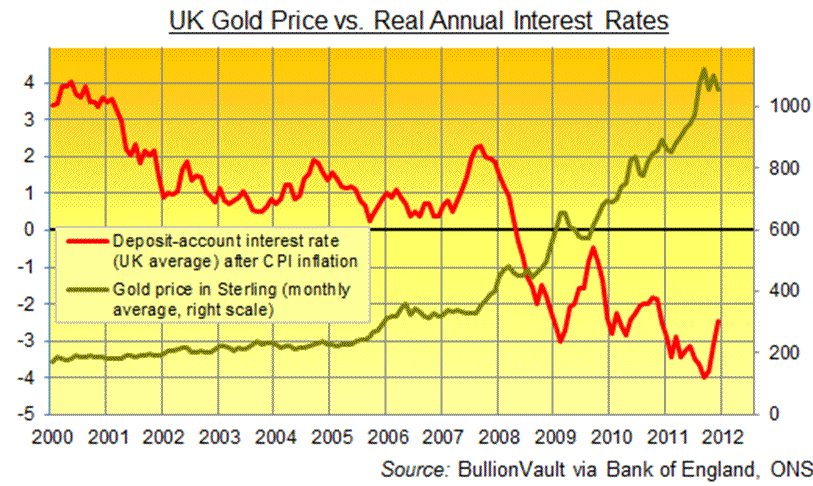UK Gold and Real Interest Rates, A Free Nation Drowining in Debt
Interest-Rates / UK Debt Jan 20, 2012 - 11:57 AM GMTBy: Adrian_Ash
 Take record-high debt, add record-low interest rates, and what do you get in gold...?
Take record-high debt, add record-low interest rates, and what do you get in gold...?
SECOND ONLY to Japan, the UK now wears the greatest debt burden of any major economy today – in total, more than 5 years' entire economic output.
Japan pips Britannia to world #1 (only just) with the loans and fixed-income debt of its national, corporate, household and financial sectors adding up to 512% of its GDP. But then Japan did take 20 years of economic depression, zombie banking and debt-fed "make work" programs to get there.
The Eurozone's heaviest debtors – the ones causing such angst worldwide – are led by Ireland at 663%, with Spain, Italy and Portugal all owing some 300% or more. Greece's gross debt is 267% of GDP. But there she is, floating off the coast of Europe with 507% gross liabilities according to McKinsey & Co.'s new Debt and Deleveraging report. That's a hefty burden to service, let alone pay down as McKinsey urges. The oddity, of course, is that a vast chunk of the UK's gross debt is money it owes to itself. Or rather, debtors owe creditors in a vast tangle, spread across the world's sixth largest economy.
Yes, there are substantial overseas debts, and the proportion of national debt held by foreigners has crept up from 25% to more than 30% in the last half-decade. But the UK's reliance on overseas funds and money markets to help finance private bank borrowing has shrunk (on our maths at least) to a little over 11% of the total since peaking at 21% in 2008.
Deleveraging is being attempted, in short, if not actually achieved. And holding onto its sovereign currency, rather than leaping into the warm embrace of German interest rates via the Eurozone pact, the UK thus remains "a free nation deep in debt" as one London hack (most likely Daniel Defoe of Robinson Crusoe fame) called Great Britain just before – oh! – its first national debt bubble blew up in 1720.
We can borrow as we choose, free from meddling Germans and their calls for austerity oversight. We can then print all the money we like to service (if not settle) those debts, safe in the knowledge that inflation will mostly hurt domestic savers, rather than risking our international credit.

"These record low gilt yields demonstrate the market's continued confidence in the Government's plans for fiscal consolidation," said a Treasury spokesman this week – no doubt just as bemused in reality as everyone else by the new all-time low hit by 10-year gilt yields. Decade-long UK government now pays less in annual interest, thanks to rising prices, than at any time since the national debt got started three centuries ago.
The impact on bank saving rates you can see above, alongside the impact on UK gold prices. With domestic savers (ie, creditors) at risk of being overwhelmed by the nation's debt, it's little wonder a growing number are seeking to abandon credit and bank risk – albeit with some small chunk or other of their savings – and embracing price risk instead in rare, indestructible physical, tradable property.
By Adrian Ash
BullionVault.com
Gold price chart, no delay | Buy gold online at live prices
Formerly City correspondent for The Daily Reckoning in London and a regular contributor to MoneyWeek magazine, Adrian Ash is the editor of Gold News and head of research at www.BullionVault.com , giving you direct access to investment gold, vaulted in Zurich , on $3 spreads and 0.8% dealing fees.
(c) BullionVault 2012
Please Note: This article is to inform your thinking, not lead it. Only you can decide the best place for your money, and any decision you make will put your money at risk. Information or data included here may have already been overtaken by events – and must be verified elsewhere – should you choose to act on it.
© 2005-2022 http://www.MarketOracle.co.uk - The Market Oracle is a FREE Daily Financial Markets Analysis & Forecasting online publication.



